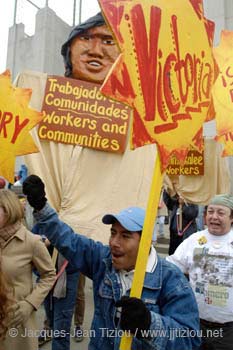Death by Homeland Security #3: The Disappeared
The hand-scrawled letter from a New Jersey jail was urgent. An immigration detainee had died that day, Sept. 9, 2005, a fellow inmate wrote in broken English, describing chest pains and pleas for medical attention that went unheeded until too late.
Death … need to be investigated,he urged a local group that corresponded with foreigners held for deportation at the jail, the Monmouth County Correctional Institute in Freehold.We care very much because that can happen to anyone of us.Yet like a message in a bottle tossed from a distant shore, even the fact of the detainee's death was soon swept away.
Inquiries by the local group were rebuffed by jail officials. Complaints forwarded to the Department of Homeland Security were logged, then forgotten. And when pressure from Congress and the news media compelled Immigration and Customs Enforcement to produce the first list of people who had died in their custody, the Freehold case was not on it.
The difficulty of confirming the very existence of the dead man, Ahmad Tanveer, 43, a Pakistani New Yorker, shows how death can fall between the cracks [sic! –R.G.] in immigration detention, the rapidly growing patchwork of more than 500 county jails, profit-making prisons and federal detention centers where half a million noncitizens were held during the last year while the government tried to deport them.
… Even now, most questions about Mr. Tanveer are unanswered, including just who he was and why he had been detained. The rescue of his death from oblivion took a rare mix of chance, vigilance by a few citizen activists, litigation by the civil liberties union and several months of inquiry by The Times. Even as the newspaper confirmed Mr. Tanveer's death with jail officials, and tracked his body's path from a Freehold morgue to the cargo hold of an airplane at Kennedy Airport, immigration authorities maintained that they could find no documents showing such a person was ever detained, or died in their custody.
Not until March 20, in response to a new request by The Times under the Freedom of Information Act, did the agency release an internal e-mail message acknowledging that the death had been overlooked. It issued a corrected list that now includes him — his first and last names transposed — among 90 people who died in immigration custody between Oct. 7, 2003, and Feb. 7, 2009.
… In Mr. Tanveer's case, efforts to draw public scrutiny were exceptional, yet went nowhere. The scrawled note by his fellow detainee, a Nigerian who garbled the dead man's name as
Ahmed Tender,reached citizen activists at the New Jersey Civil Rights Defense Committee, who were unable to confirm it. Other complaints that Mr. Tanveer did not receive proper care separately reached a former member of the group, Jean Blum, a disabled Holocaust survivor who had continued corresponding with dozens of detainees from her home in Paterson, N.J., even though she could barely afford the postage.
I am very, very aware of the issues that involve displaced people,said Ms. Blum, 73, who was a child when she and her parents, Polish Jews, fled the Nazis.I could not turn my back, because that is my history.Ms. Blum forwarded a packet of correspondence about the death to the Department of Homeland Security's inspector general by Sept. 20, 2005, seeking an investigation. But within weeks, documents show, the matter was simply passed for internal inquiry to the immigration agency, which is part of Homeland Security, with the notation that it need not bother to report back its findings.
Years after Mr. Tanveer's death, the scrawled note about his heart attack came to the attention of the A.C.L.U., and its lawyers noticed that no such name appeared on the first government list of 66 people published by The Times in 2008. The union added the name to its lawsuit, and eventually obtained the paper trail on what Ms. Blum had sent the government.
The union learned that the inspector general's office had written up a synopsis of the allegations for investigation by the immigration agency, saying that
Ahmad Tander,a Pakistani detainee housed at the Monmouth jail, had diedfrom a heart attack whose symptoms were obvious, severe and ignored until it was too late,amidconditions of neglect and indifference to medical needs.But when the A.C.L.U. pressed for more, government lawyers said no further records could be found.
Early this year, The Times called a spokeswoman for the Monmouth County Sheriff, who confirmed the death and gave the name as Tanver — later correcting the spelling to Tanveer.
In names transcribed from a foreign alphabet, such variations often pose a problem of identification. But the facts matched: Mr. Tanveer had arrived at the jail in immigration custody on Aug. 12, 2005, and on Sept. 9 was taken by ambulance to CentraState Medical Center in Freehold, where he died, the spokeswoman, Cynthia Scott, said. Under the jail's federal contract, she said, nothing more could be disclosed.
A CentraState spokesman initially denied that such a patient had died at the hospital. Later the medical record was found misfiled, and the spokesman, James M. Goss, confirmed the man's death at age 43. But, citing privacy laws and policy, he declined to answer other questions about the case, including what had happened to the body.
In New Jersey, as in many states, autopsy reports are private. But the county morgue confirmed that an autopsy had been performed. Eventually, two details were shared: the name of the Queens funeral home that picked up the body for burial on Sept. 12, and the fact that the autopsy report was sent two months later to Mark Stokes, an official in the New York office of Immigration and Customs Enforcement.
Yet for more than three years since, the tallies and testimony that the agency submitted to Congress about detainee deaths have not included the Tanveer case.
In January 2009, equipped with confirmation, The Times again requested documents in Mr. Tanveer's death. President Obama had just directed federal agencies to err on the side of transparency in releasing records to the public. But a Freedom of Information officer soon said she was stymied: Immigration record-keepers told her no documents could be located without the dead man's date of birth or eight-digit alien registration number.
And the body? The director of the funeral home, Coppola-Migliore in Corona, Queens, said Mr. Tanveer's New York relatives had it flown to Pakistan for burial, using Pakistan International Airlines. But the funeral director declined to identify the relatives without their permission and said they had not returned phone calls. And the Pakistani Consulate had no record of the case.
Also futile was a search for witnesses among fellow detainees, many since deported. The Nigerian detainee who wrote the urgent letter, an ailing diabetic, was later released pending a deportation hearing. According to social workers at the Queens-based charity that was his last known contact, he is now a homeless fugitive, lost in the streets of New York.
Victoria L. Allred, chief of staff in the financial office of Immigration and Customs Enforcement, wrote in an internal e-mail message March 4 that the death had not been discovered until after the chart omitting it had been submitted to Congress for the latest subcommittee hearing, March 3.
I apologize for the discrepancy,she wrote.Yet as of Thursday, immigration authorities still have not released records on Mr. Tanveer's detention or death, which they attribute to
occlusive coronary atherosclerosis,nor have they addressed the complaint that his heart attack went untreated in the jail for more than two hours.On the expanded list, he is the only detainee with no birth date. And in the e-mail message acknowledging the death, his alien registration number has been redacted — to protect his privacy, the government said.
Ahmad Tanveer was abducted, caged, deliberately denied medical care and left to die in jail, and then disappeared by the United States federal government’s bordercrats and their hired thugs, who have gone up and down the chain of command denying, declining, misfiling
and deliberately blocking disclosure of information about the case at every turn. They haven’t done a damned thing to investigate this man’s murder and they’ve did their best for years to make sure that nobody ever found out much of anything about it. The Times deserves a great deal of credit for doggedly investigating, and ultimately exposing, what has been going on in la Migra’s special prison system. But there’s a deep problem with passing it off as a matter of some poor shmoe falling between the cracks
of a patchwork system of government immigration jails — as if this were a matter of disorganization or bureaucratic inefficiency — rather than what it is, an act of administrative murder, followed by a campaign of repeated stonewalling and cover-ups, under the excuse of Homeland Security, or on the outrageous claim that they are doing it out of concern for the privacy of their own victim. Not just in this one case, but over, and over again, to God knows how many people:
We still do not know, and we cannot know, if there are other deaths that have never been disclosed by ICE, or that ICE itself knows nothing about,said Tom Jawetz, a lawyer with the American Civil Liberties Union, which has been battling in court for months to obtain government records on all detention deaths, including the Freehold case and those named on the first government list, obtained by The New York Times under the Freedom of Information Act and published last year.…
We believe we have accounted for every single detainee death,Kelly Nantel, a spokeswoman for Immigration and Customs Enforcement, said last week, adding that a death in March was promptly reported to Congress under a policy directive from Dora Schriro, the new administration's special adviser on detention.Yet even the latest list, which Ms. Nantel called
comprehensive, thorough,is missing a known death from 2008: that of Ana Romero Rivera, a 44-year-old Salvadoran cleaning woman who was found hanged last August in an isolation cell in a county jail in Frankfort, Ky., where she was awaiting deportation. Federal officials now disagree whether she was legally in their custody when she died.There are unverified reports that other detainees may have died unnamed and uncounted. At the Florida Immigrant Advocacy Center in Miami, for example, directors cite a letter in late July 2007 from a detainee who described an 18-year-old Haitian woman,
Mari Rosa,coughing up blood for hours without medical attention at the Glades County Jail in Moore Haven, Fla. The letter said she fell to the ground, had no pulse when she was finally taken to the medical unit and was never brought back, adding,The detainees think she is dead.The center has been unable to confirm what happened to that woman, said Susana Barciela, its policy director.
… As Congress and the news media brought new scrutiny to the issue, several detention deaths have highlighted problems with medical care and accountability. In one, a Chinese computer engineer's extensive cancer and fractured spine went undiagnosed at a Rhode Island jail until shortly before he died, despite his pleas for help. In another, records show a Guinean tailor who suffered a skull fracture in a New Jersey jail was left in isolation without treatment for more than 13 hours.
Representative Zoe Lofgren of the state of California, is shocked — shocked! — to find that such a thing would be going on in the government’s special immigration prisons:
How can you overlook a guy who died in your custody?asked Rep. Zoe Lofgren, a California Democrat who has presided over two subcommittee hearings dealing with care and deaths in detention, battling unsuccessfully for full disclosure from immigration officials.Did they forget other people? Was it an isolated, single error, or was it something more sinister?
But the answer to these questions are easy. This case — all these cases, and more — happened because of a single error. But not an isolated
one. The system itself is the error
— there is no possible way to enforce immigration controls without creating special, parallel systems of imprisonment and administrative courts in which basic civil liberties and basic principles of due process are eliminated. There is no possible way for the government to go around trying to detect and exile undocumented immigrants without reversing basic components of due process, like the presumption of innocence. Any system of immigration documentation necessarily places the burden on the documented person to prove to the government’s satisfaction, by producing their documentation, that they have a right to exist where they do — rather than putting the burden on the government to prove that they do not. (The government will no doubt object that they can’t prove a negative. Of course they can’t, which is why they can’t implement a system of border laws within the bounds of anything resembling due process. Which is an argument against border laws, not against due process.) Any system of border laws whatever will always produce special prisons and special courts for the administration of the federal Fugitive Alien Acts, in which those imprisoned and judged will be stripped of basic privileges or immunities, and denied any realistic hope of recourse for crimes committed against them.
When Anarchists speak about a society based on consent, and when we say that we can settle any genuine issue of socio-economic coordination and community life through consensual, grassroots processes of negotiation and free association or dissociation — without government armies, government borders, or government prisons — we are constantly accused, by some sanctimonious know-it-all who presumes that repeating statist chestnuts amounts to hard-nosed realism and some special expertise in history and in the problems of life, of being utopians, whose ideas have no hope of practical workability. But as a matter of fact, we Anarchists have nothing on those who imagine that there can be some right way to run statist institutions, with the right policies in place and with virtuous and competent people to administer them, that will somehow avoid the predictable results that have happened in every other government institution like it. It takes the most naive sort of utopianism, and the cruelest sort of killing negligence, to go on pretending, in the face of both logic and historical evidence, that there is some possible way for government to construct systems of special tribunals in which people are treated as legal non-persons, without bringing along what this sort of thing has always and everywhere produced — effectively unchecked power by the government over its prisoners, who are granted no rights and given no recourse, and, what always follows unchecked power, rampant brutality, negligence, lying, death, and disappearance. There is no way to do it, no way at all. You cannot enforce border laws without constructing a system like that, and you cannot construct a system like that without, eventually, to a greater or a lesser degree, repeating every brutality and every horror that has always come along with every system of legal black holes, special security courts, and concentration camps that the world has ever known.


